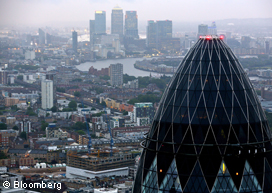A trader at the centre of rate-manipulation allegations levelled at Barclays communicated with counterparts at Rabobank, the Dutch bank, about trading positions related to Euribor, the Financial Times has learned.
Regulators are examining communications between Philippe Moryoussef, a senior euro swaps trader at Barclays until 2007, and Rabobank, according to people familiar with the investigation. The involvement of Rabobank, which until June was triple A-rated, sheds light on the trajectory of part of the worldwide probe into rigging of key inter-bank lending rates.
The Dutch central bank is examining submissions to Euribor, the Brussels inter-bank lending rate that determines payments of over €250trn worth of futures contracts by averaging 43 panel banks’ responses. Dutch involvement adds to at least 10 other regulators and criminal prosecutors across three continents that are probing as many as 20 financial institutions.
Barclays was the first to settle its part in the Libor and Euribor probe, paying £290m in fines to US agencies and the UK’s Financial Services Authority in June, sparking a political firestorm that claimed the bank’s top executives.
FSA findings accompanying the settlement state that Trader E – which people familiar with the documents confirmed was Mr Moryoussef – and five other swaps traders at Barclays regularly communicated with peers at six other banks on the Euribor panel. As well as Rabobank, the FT reported that those banks included HSBC, Société Générale, Deutsche Bank and Crédit Agricole.
No individual has been accused of wrongdoing and regulators’ probes into banks except Barclays are continuing. Barclays and Rabobank are among seven defendants named in a class action alleging Euribor manipulation filed in New York.
There were at least 20 requests from rival banks to Barclays’ Euribor submitters to lower or raise rates between 2006 and 2008, according to FSA findings that detail attempts to align trading strategies for profit.
Rabobank and Barclays declined to comment. Dutch press reported last month that Rabobank fired four London-based submitters between 2008 and 2011 who had cut deals with traders at other unnamed institutions.
Mr Moryoussef was a senior figure among the Euribor community. The chief executive of the European Banking Federation, which publishes Euribor, said Mr Moryoussef, 44, was shortlisted to join the governance committee of Euribor – the very rate whose potential manipulation regulators are now probing.
Mr Moryoussef, who by then had joined the Royal Bank of Scotland, ultimately never became a member and the EBF scrapped the idea of having a UK bank representative on the steering committee, Guido Ravoet added. Public minutes of a November 2007 governance committee meeting list Mr Moryoussef as being a participant, but “excused” from proceedings.
A lawyer for Mr Moryoussef declined to comment. He most recently was an employee of Nomura in Singapore.
He was also a member of ACI, an industry group that co-founded Euribor, and which nominates members to Euribor’s steering committee and determines which banks sit on the rate’s panel.
Mr Moryoussef was part of ACI’s working group on derivatives, which at the time was researching whether a new swaps reference rate could be created, according to a fellow member. Also participating in the same group was Michael Zrihen, a former trader at Crédit Agricole with whom Mr Moryoussef communicated on Euribor submissions, according to people familiar with regulators’ investigations. Mr Zrihen could not immediately be reached for comment.
“Everyone has driving licenses, but only a few have accidents,” said Jean-Pierre Ravise, ACI’s director, who confirmed the men’s participation but said they were no longer members of the association. “Mathematically, it would be near-impossible to manipulate Euribor.”
> Additional reporting by Jennifer Thompson and Patrick Jenkins in London, Matt Steinglass in Amsterdam and Izabella Kaminska in Geneva







Aucun commentaire:
Enregistrer un commentaire
Laissez vos impressions